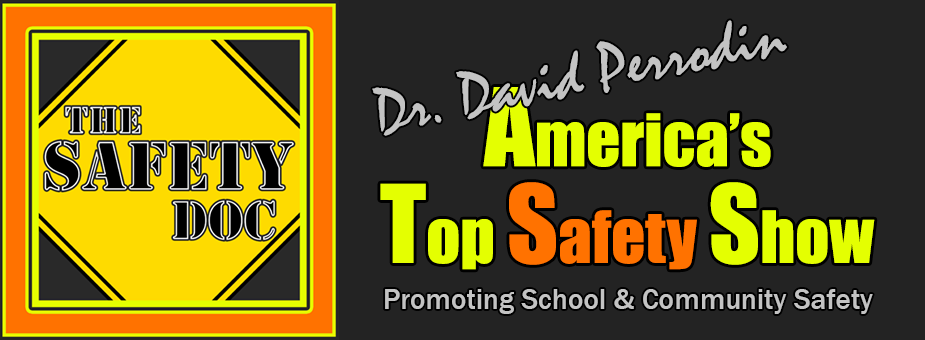Confirmation Bias in School Safety with Dr. David Perrodin | SAFETY DOC PODCAST #94
[PODCAST] I was attending a convention for school safety “experts” – I suppose. The presentations were a mix of pitches from field experts and product vendors. There wasn’t much new for me to learn and I found myself rather cynical and skeptical watching others present on school safety as everyone has a self-serving agenda. One of the veteran experts, someone I knew and tipped my hat to his work in both law enforcement and then in schools. He begins his presentation with an amazing example of confirmation bias and headline research. Headlines appear on the screen – the baited / incomplete headlines of school shootings and school violence. A few seconds of audio from a news reporter interrupted by another clip and another. Headline after headline and faster and faster and more dramatic, rising background music for maybe 100 seconds. The screen goes dark. The presenter stands silent for an uncomfortable number of seconds. “That, ladies and gentlemen, is the urgency of school safety in America”, he said. I countered that this was not the state of school safety in America, but rather a perfect example of “headline research” manifesting in confirmation bias. Yet, had that convention room been filled with parents, they would have demanded action – or fortification. Now. At any cost.
DIRECT LINK to MP3 of this Episode: https://tinyurl.com/SDP94
WHAT IS CONFIRMATION BIAS
Per Wikipedia, confirmation bias is the tendency to search for, interpret, favor, and recall information in a way that confirms one’s preexisting beliefs or hypotheses. It is a type of cognitive bias and a systematic error of inductive reasoning. People display this bias when they gather or remember information selectively, or when they interpret it in a biased way. The effect is stronger for emotionally charged issues and for deeply entrenched beliefs. People also tend to interpret ambiguous evidence as supporting their existing position. Biased search, interpretation and memory have been invoked to explain attitude polarization (when a disagreement becomes more extreme even though the different parties are exposed to the same evidence), belief perseverance (when beliefs persist after the evidence for them is shown to be false), the irrational primacy effect (a greater reliance on information encountered early in a series) and illusory correlation (when people falsely perceive an association between two events or situations).
HOW CONFIRMATION BIAS IMPACTS SCHOOL SAFETY
Remember, people will seek information that supports their beliefs. I can recognize this immediately when I’m not a “fit” for a school district that has hired me as a consultant. When I deviate from their company line, the audience frowns or they get a worried look. Confirmation bias often assumes there’s been some type of research conducted – but I’ve found that’s just not accurate – it’s more like my colleague and his headlines. Confirmation bias will prevent systems from evolving. New thinking is dismissed.
THEY SAW A GAME; A CASE STUDY
“When the Dartmouth football team played Princeton in 1951, much controversy was generated over what actually took place during the game. Basically, there was disagreement between the two schools as to what had happened during the game. A questionnaire designed to get reactions to the game and to learn something of the climate of opinion was administered at each school and the same motion picture of the game was shown to a sample of undergraduate at each school, followed by another questionnnaire. Results indicate that the “game” was actually many different games and that each version of the events that transpired was just as “real” to a particular person as other versions were to other people.” (PsycINFO Database Record (c) 2016 APA, all rights reserved) Hastorf, A. H., & Cantril, H. (1954). They saw a game; a case study. The Journal of Abnormal and Social Psychology, 49(1), 129-134.)
FOLLOW
- PodBean MP3 https://tinyurl.com/SDP94
- Apple Podcasts http://tinyurl.com/SafetyDocApplePodcasts
- SUBSCRIBE to “The Safety Doc” YouTube channel https://tinyurl.com/SDP94-VIDEO
- The 405 Media http://the405media.com/the-safety-doc/
- Radio and Podcast https://www.radioandpodcast.com/
- SAFETY DOC WEBSITE & BLOG safetyphd.com
- Follow David & The Safety Doc Podcast on Twitter @SafetyPhD
- Email Dr. Perrodin [email protected]
Looking for Dr. Timothy Ludwig, PhD?
Dr. Perrodin’s “Safety Doc Podcast” negotiates school and community safety. To be informed about industrial safety, please contact Appalachian State University Professor Dr. Timothy Ludwig, PhD, at www.safety-doc.com
Endorsement
Learn About the Nation’s Leading Bullying & School Safety Reporting System – SPRIGEO www.sprigeo.com

[…] Source: https://safetyphd.com/confirmation-bias-in-school-safety-with-dr-david-perrodin-safety-doc-podcast-94… […]